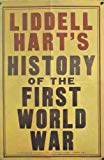
History of the First World War PDF
Preview History of the First World War
The most influential British military writer of his time' The Spectator
Liddell Hart's History of the First World War first appeared in 1930 and is widely regarded as one of the greatest, most cogent accounts of the conflict ever published.
A leading military strategist and historian who fought on the Western Front, Liddell Hart combines astute tactical analysis with compassion for those who lost their lives on the battlefield. He provides a vivid and fascinating picture of all the major campaigns, balancing documentary evidence with the testimony of personal witnesses to expose the mistakes that were made and why.
From the political and cultural origins of war to the twists and turns of battle, to the critical decisions that resulted in such devastating losses and to the impact on modern nations, this magnificent history covers four brutal years in one volume and is a true military classic.
ReviewImmensely readable and informative ... belongs in the possession of anyone interested in what the greatest British military thinker of this century has to say Soldier Liddell Hart makes the complicated scene intelligible to the reader with the minimum of effort, and yet incorporates an apt and telling comments at every turn The Times Literary Supplement The outstanding military historian Sunday Express Scrupulously accurate, brilliantly lucid British Army Review Brilliant ... the best one-volume history of the First World War ever likely to be wriiten Naval Review It was always his special talent to be able to express military situations in telling and limpid phrases which would stick in the reader's mind Daily Telegraph Remarkable for its clarity and objectivity ... it remains outstanding: for those familiar with its subject, illuminating and thought-provoking; for those new to it and wishing to know what happened in World War I, the best place to begin Western Mail
About the AuthorSir Basil Liddell Hart was a military strategist and writer of great acclaim, and one of the world's outstanding teacher-historians. Born in Paris in 1895, he was educated at Cambridge before serving on the Western Front with the Yorkshire Light Infantry after which he was military correspondent of the Daily Telegraph and The Times. He evolved several military tactical developments including the Battle Drill system and was an early advocate of airpower and armoured forces. He lectured on strategy and tactics at staff colleges in numerous countries. His many books include biographies of several great commanders, and The Other Side of the Hill - his interviews with the Second World War's highest-ranking German generals. He was knighted in 1966 and died in 1970.
